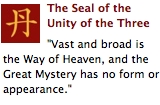Taoist Texts
 Daode jing (Book of the Way and its Virtue): The Taoist Saint
Daode jing (Book of the Way and its Virtue): The Taoist Saint
The Daode jing 道德經 (Book of the Way and its Virtue), a short work consisting of aphorisms attributed to Laozi (the Old Master), is the main early Taoist text. Virtually all movements and lineages within Taoism consider this as the founding scripture of the entire tradition, even though they may venerate their own texts and their own founders. These selections are concerned with the Saint and his state of "non-doing" (wuwei).
 Zhuangzi (Book of Master Zhuang)
Zhuangzi (Book of Master Zhuang)
Deemed to be one of the masterpieces of Chinese literature, the Zhuangzi 莊子 (Book of Master Zhuang) differs from the Daode jing from the point of view of its formal features, and mainly consists of stories, anecdotes, and reflections. But in spite of differences of form and emphasis, the two texts present the same view of the Dao and its relation to the world. Virtually nothing is known about Zhuangzi, who probably lived in the late 4th century BCE and is almost certainly the author of only the seven so-called "Inner Chapters" of the text that bears his name. His work has provided Taoism with doctrines, notions, and technical vocabulary throughout its history.
 Huainan zi (Book of the Master of Huainan)
Huainan zi (Book of the Master of Huainan)
The Huainan zi 淮南子 (Book of the Master of Huainan) was compiled in 139 BCE under the editorship of Liu An, the prince of the southern kingdom of Huainan. A vast work containing twenty-one chapters (or twenty-eight, in some editions), it stands out as a work of synthesis of different traditions, including teachings based on the Daode jing and the Zhuangzi, as an exposition of the arts of government and self-cultivation, and as a description of several cosmological sciences.
 Laozi zhongjing (Central Scripture of Laozi)
Laozi zhongjing (Central Scripture of Laozi)
With the Huangting jing (Scripture of the Yellow Court), the Laozi zhongjing 老子中經 (Central Scripture of Laozi) is the main early text devoted to meditation practices on the inner gods. Most scholars agree in dating this work to the early 3rd century. It contains descriptions of loci of the inner body, visualizations to be performed on certain days and hours, and invocations addressed to the inner and outer gods. These practices are combined with the visualization of nutritive essences that adepts circulate through the body and deliver to the gods in the five viscera, the three Cinnabar Fields, and other inner organs and loci. The speaker of the text is the deified Laozi.
 Baopu zi (Book of the Master Who Embraces Simplicity)
Baopu zi (Book of the Master Who Embraces Simplicity)
Ge Hong's Baopu zi neipian 抱朴子內篇 (Inner Chapters of the Book of the Master Who Embraces Simplicity), completed around 320 CE, provides a personal but extended overview of several Chinese religious traditions. At one end of this spectrum of traditions, Ge Hong places the "coarse and rustic practitioners" who devote themselves to healing methods, longevity techniques, divination, and magic. At the other end of the spectrum are alchemy and meditation, which in Ge Hong's views represent the culmination of the search for transcendence. Ingesting the elixirs enables an adept to obtain immortality, communicate with the gods, and expel the noxious spirits. Meditation on the True One and the Mysterious One similarly gives access to the divine world and affords control over gods and demons.





